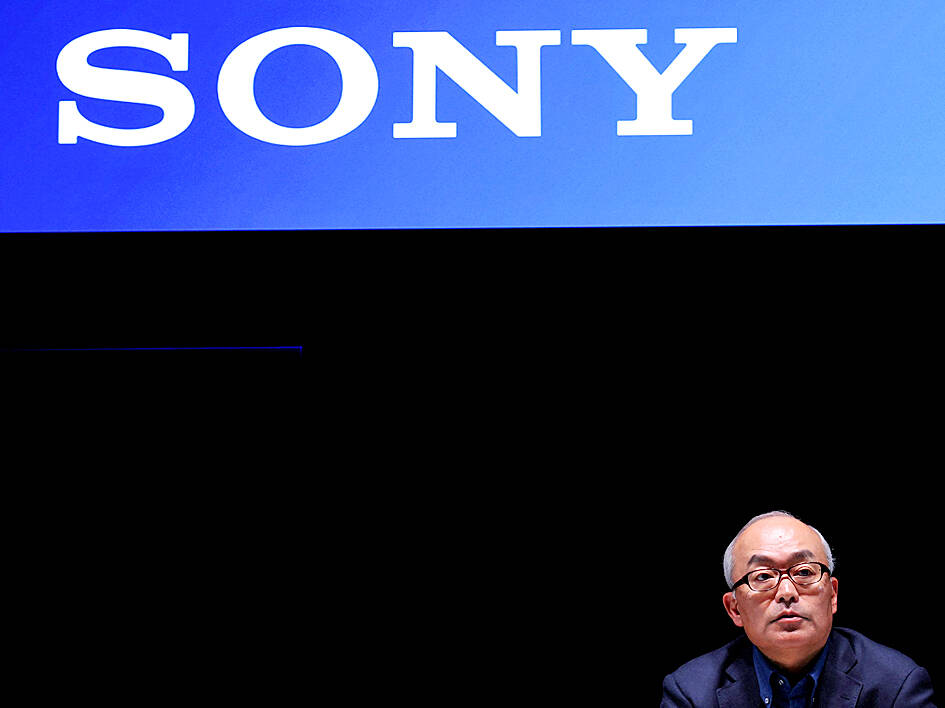Sony Group Corp is appointing Hiroki Totoki. 60, as chief executive officer, a stamp of approval for the longtime finance chief’s push to expand the Japanese company’s entertainment reach.
Along with outgoing CEO Kenichiro Yoshida, Totoki helped steer the Tokyo-based technology conglomerate to focus on growing its entertainment offerings. Last year alone, the company expressed interest in potential acquisitions ranging from Paramount Global to domestic publishing house Kadokawa Corp.
That focus on content — which spans PlayStation games, anime, music and movies — is bolstering revenue and profit at Sony. In the September quarter, operating profit grew 76 percent year-on-year amid sluggish demand for its smartphone components and image sensors, used by the likes of Apple Inc and Xiaomi Corp (小米).

Photo: Reuters
Yoshida is to remain as chairman of the board, Sony said in a statement yesterday.
Hideaki Nishino is to take charge of the company’s pivotal game and network services business, while Hermen Hulst is newly appointed as CEO of the game studio business. The moves, all effective April 1, are part of a new management structure intended to secure Sony’s long-term growth, the company said.
Totoki had taken up more of the leadership burden at Tokyo-based Sony two years prior, when he added the titles of president and chief operating officer to his role as chief financial officer. He provides Sony’s commentary on conference calls after earnings each quarter and has steered the company through a difficult time with prolonged supply shortages of its flagship PlayStation 5 console.

Taiwan Semiconductor Manufacturing Co (TSMC, 台積電) would not produce its most advanced technologies in the US next year, Minister of Economic Affairs J.W. Kuo (郭智輝) said yesterday. Kuo made the comment during an appearance at the legislature, hours after the chipmaker announced that it would invest an additional US$100 billion to expand its manufacturing operations in the US. Asked by Taiwan People’s Party Legislator-at-large Chang Chi-kai (張啟楷) if TSMC would allow its most advanced technologies, the yet-to-be-released 2-nanometer and 1.6-nanometer processes, to go to the US in the near term, Kuo denied it. TSMC recently opened its first US factory, which produces 4-nanometer

GREAT SUCCESS: Republican Senator Todd Young expressed surprise at Trump’s comments and said he expects the administration to keep the program running US lawmakers who helped secure billions of dollars in subsidies for domestic semiconductor manufacturing rejected US President Donald Trump’s call to revoke the 2022 CHIPS and Science Act, signaling that any repeal effort in the US Congress would fall short. US Senate Minority Leader Chuck Schumer, who negotiated the law, on Wednesday said that Trump’s demand would fail, while a top Republican proponent, US Senator Todd Young, expressed surprise at the president’s comments and said he expects the administration to keep the program running. The CHIPS Act is “essential for America leading the world in tech, leading the world in AI [artificial

REACTIONS: While most analysts were positive about TSMC’s investment, one said the US expansion could disrupt the company’s supply-demand balance Taiwan Semiconductor Manufacturing Co’s (TSMC, 台積電) new US$100 billion investment in the US would exert a positive effect on the chipmaker’s revenue in the medium term on the back of booming artificial intelligence (AI) chip demand from US chip designers, an International Data Corp (IDC) analyst said yesterday. “This is good for TSMC in terms of business expansion, as its major clients for advanced chips are US chip designers,” IDC senior semiconductor research manager Galen Zeng (曾冠瑋) said by telephone yesterday. “Besides, those US companies all consider supply chain resilience a business imperative,” Zeng said. That meant local supply would

BIG INVESTMENT: Hon Hai is building the world’s largest assembly plant for servers based on Nvidia Corp’s state-of-the-art AI chips, Jalisco Governor Pablo Lemus said The construction of Hon Hai Precision Industry Co’s (鴻海精密) massive artificial intelligence (AI) server plant near Guadalajara, Mexico, would be completed in a year despite the threat of new tariffs from US President Donald Trump, Jalisco Governor Pablo Lemus said. Hon Hai, also known as Foxconn Technology Group (富士康科技集團), is investing about US$900 million in what would become the world’s largest assembly plant for servers based on Nvidia Corp’s state-of-the-art GB200 AI chips, Lemus said. The project consists of two phases: the expansion of an existing Hon Hai facility in the municipality of El Salto, and the construction of a